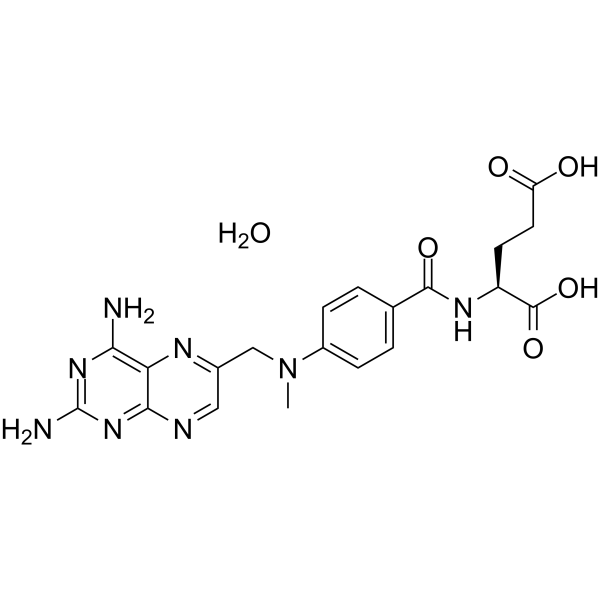D-AMETHOPTERIN HYDRATE
Modify Date: 2024-01-06 07:42:37

D-AMETHOPTERIN HYDRATE structure
|
Common Name | D-AMETHOPTERIN HYDRATE | ||
|---|---|---|---|---|
| CAS Number | 6745-93-3 | Molecular Weight | 472.45500 | |
| Density | N/A | Boiling Point | N/A | |
| Molecular Formula | C20H24N8O6 | Melting Point | 195ºC (dec.)(lit.) | |
| MSDS | N/A | Flash Point | N/A | |
Use of D-AMETHOPTERIN HYDRATEMethotrexate (Amethopterin) monohydrate, an antimetabolite and antifolate agent, inhibits the enzyme dihydrofolate reductase, thereby preventing the conversion of folic acid into tetrahydrofolate, and inhibiting DNA synthesis. Methotrexate monohydrate, also an immunosuppressant and antineoplastic agent, is used for the research of rheumatoid arthritis and a number of different cancers (such as acute lymphoblastic leukemia)[1][2][3]. |
| Name | d-amethopterin hydrate, 95 |
|---|---|
| Synonym | More Synonyms |
| Description | Methotrexate (Amethopterin) monohydrate, an antimetabolite and antifolate agent, inhibits the enzyme dihydrofolate reductase, thereby preventing the conversion of folic acid into tetrahydrofolate, and inhibiting DNA synthesis. Methotrexate monohydrate, also an immunosuppressant and antineoplastic agent, is used for the research of rheumatoid arthritis and a number of different cancers (such as acute lymphoblastic leukemia)[1][2][3]. |
|---|---|
| Related Catalog | |
| Target |
Traditional Cytotoxic Agents |
| In Vivo | Methotrexate (Amethopterin) monohydrate reduces thymus and spleen indices of mice. Methotrexate monohydrate markedly decreases white blood cells, thymic and splenic lymphocytes at dose ≥5 mg/kg. However, there is a significant difference between the treatment plus control group and the model group (p<0.01). The combination of grape seed proanthocyanidins and Siberian ginseng eleutherosides obviously diminishes the effects of Methotrexate monohydrate exposure on indices of thymus and spleens in mice[2]. Methotrexate (MTX) monohydrate (2 mg/kg; i.p.; once in a week for 5 weeks) is effective in Freund's complete adjuvant-induced arthritis. The combination of Methotrexate monohydrate (1 mg/kg; i.p.; once in a week for 5 weeks) and Curcumin (30 mg/kg and 100 mg/kg, thrice a week for 5 weeks; i.p.) shows a significant anti-arthritic action and protection from hematological toxicity[4]. |
| References |
[2]. Swierkot J, et al. Methotrexate in rheumatoid arthritis. Pharmacol Rep. 2006 Jul-Aug;58(4):473-92. |
| Melting Point | 195ºC (dec.)(lit.) |
|---|---|
| Molecular Formula | C20H24N8O6 |
| Molecular Weight | 472.45500 |
| Exact Mass | 472.18200 |
| PSA | 210.98000 |
| LogP | 1.31280 |
| Risk Phrases | 46-60-61-25-36/37/38 |
|---|---|
| Safety Phrases | 53-22-26-36/37/39-45 |
| RIDADR | UN 1544 6.1/PG 3 |
| L-Glutamic acid,N-4-(2,4-diamino-6-pteridinyl)methylmethylaminobenzoyl-,monohydrate |
| MTX hydrate |